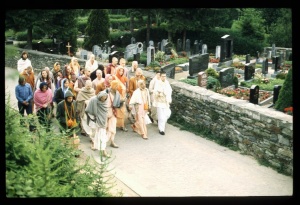SB 10.41.31: Difference between revisions
m (1 revision(s)) |
(Vanibot #0054 edit - transform synonyms into clickable links, which search similar occurrences) |
||
| (One intermediate revision by one other user not shown) | |||
| Line 1: | Line 1: | ||
{{info | {{info | ||
|speaker=women of | |speaker=women of Mathurā | ||
|listener=women of | |listener=women of Mathurā | ||
}} | }} | ||
[[Category:Srimad-Bhagavatam - Canto 10 Chapter 41]] | |||
[[Category:Bhagavatam Verses Spoken by the Women of Mathura - Vanisource|104131]] | |||
<div style="float:left">'''[[Srimad-Bhagavatam]] - [[SB 10|Tenth Canto]] - [[SB 10.41: Krsna and Balarama Enter Mathura|Chapter 41: Kṛṣṇa and Balarāma Enter Mathurā]]'''</div> | |||
<div style="float:right">[[File:Go-previous.png|link=SB 10.41.30]] '''[[SB 10.41.30]] - [[SB 10.41.32]]''' [[File:Go-next.png|link=SB 10.41.32]]</div> | |||
{{RandomImage}} | |||
{{SBnotice}} | |||
==== TEXT 31 ==== | ==== TEXT 31 ==== | ||
<div | <div class="verse"> | ||
ūcuḥ paurā aho gopyas | :ūcuḥ paurā aho gopyas | ||
tapaḥ kim acaran mahat | :tapaḥ kim acaran mahat | ||
yā hy etāv anupaśyanti | :yā hy etāv anupaśyanti | ||
nara-loka-mahotsavau | :nara-loka-mahotsavau | ||
</div> | </div> | ||
| Line 17: | Line 22: | ||
==== SYNONYMS ==== | ==== SYNONYMS ==== | ||
<div | <div class="synonyms"> | ||
''[//vanipedia.org/wiki/Special:VaniSearch?s=ūcuḥ&tab=syno_o&ds=1 ūcuḥ]'' — said; ''[//vanipedia.org/wiki/Special:VaniSearch?s=paurāḥ&tab=syno_o&ds=1 paurāḥ]'' — the women of the city; ''[//vanipedia.org/wiki/Special:VaniSearch?s=aho&tab=syno_o&ds=1 aho]'' — ah; ''[//vanipedia.org/wiki/Special:VaniSearch?s=gopyaḥ&tab=syno_o&ds=1 gopyaḥ]'' — the cowherd girls (of Vṛndāvana); ''[//vanipedia.org/wiki/Special:VaniSearch?s=tapaḥ&tab=syno_o&ds=1 tapaḥ]'' — austerity; ''[//vanipedia.org/wiki/Special:VaniSearch?s=kim&tab=syno_o&ds=1 kim]'' — what; ''[//vanipedia.org/wiki/Special:VaniSearch?s=acaran&tab=syno_o&ds=1 acaran]'' — have executed; ''[//vanipedia.org/wiki/Special:VaniSearch?s=mahat&tab=syno_o&ds=1 mahat]'' — great; ''[//vanipedia.org/wiki/Special:VaniSearch?s=yāḥ&tab=syno_o&ds=1 yāḥ]'' — who; ''[//vanipedia.org/wiki/Special:VaniSearch?s=hi&tab=syno_o&ds=1 hi]'' — indeed; ''[//vanipedia.org/wiki/Special:VaniSearch?s=etau&tab=syno_o&ds=1 etau]'' — these two; ''[//vanipedia.org/wiki/Special:VaniSearch?s=anupaśyanti&tab=syno_o&ds=1 anupaśyanti]'' — constantly see; ''[//vanipedia.org/wiki/Special:VaniSearch?s=nara&tab=syno_o&ds=1 nara]-[//vanipedia.org/wiki/Special:VaniSearch?s=loka&tab=syno_o&ds=1 loka]'' — for human society; ''[//vanipedia.org/wiki/Special:VaniSearch?s=mahā&tab=syno_o&ds=1 mahā]-[//vanipedia.org/wiki/Special:VaniSearch?s=utsavau&tab=syno_o&ds=1 utsavau]'' — who are the greatest source of pleasure. | |||
</div> | </div> | ||
{{SBcollapse}} | |||
==== TRANSLATION ==== | ==== TRANSLATION ==== | ||
<div | <div class="translation"> | ||
The women of Mathurā exclaimed: Oh, what severe austerities the gopīs must have performed to be able to regularly see Kṛṣṇa and Balarāma, who are the greatest source of pleasure for all mankind! | The women of Mathurā exclaimed: Oh, what severe austerities the gopīs must have performed to be able to regularly see Kṛṣṇa and Balarāma, who are the greatest source of pleasure for all mankind! | ||
</div> | </div> | ||
__NOTOC__ | </div> | ||
</div> | |||
<div style="float:right">[[File:Go-previous.png|link=SB 10.41.30]] '''[[SB 10.41.30]] - [[SB 10.41.32]]''' [[File:Go-next.png|link=SB 10.41.32]]</div> | |||
__NOTOC__ | |||
__NOEDITSECTION__ | |||
Latest revision as of 19:00, 17 February 2024

A.C. Bhaktivedanta Swami Prabhupada
Please note: The synonyms, translation and purport of this verse were composed by disciples of Śrīla Prabhupāda
TEXT 31
- ūcuḥ paurā aho gopyas
- tapaḥ kim acaran mahat
- yā hy etāv anupaśyanti
- nara-loka-mahotsavau
SYNONYMS
ūcuḥ — said; paurāḥ — the women of the city; aho — ah; gopyaḥ — the cowherd girls (of Vṛndāvana); tapaḥ — austerity; kim — what; acaran — have executed; mahat — great; yāḥ — who; hi — indeed; etau — these two; anupaśyanti — constantly see; nara-loka — for human society; mahā-utsavau — who are the greatest source of pleasure.
Translation and purport composed by disciples of Śrīla Prabhupāda
TRANSLATION
The women of Mathurā exclaimed: Oh, what severe austerities the gopīs must have performed to be able to regularly see Kṛṣṇa and Balarāma, who are the greatest source of pleasure for all mankind!